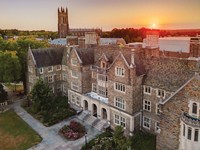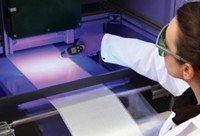Advertisement
Grab your lab coat. Let's get started
Welcome!
Welcome!
Create an account below to get 6 C&EN articles per month, receive newsletters and more - all free.
It seems this is your first time logging in online. Please enter the following information to continue.
As an ACS member you automatically get access to this site. All we need is few more details to create your reading experience.
Not you? Sign in with a different account.
Not you? Sign in with a different account.
ERROR 1
ERROR 1
ERROR 2
ERROR 2
ERROR 2
ERROR 2
ERROR 2
Password and Confirm password must match.
If you have an ACS member number, please enter it here so we can link this account to your membership. (optional)
ERROR 2
ACS values your privacy. By submitting your information, you are gaining access to C&EN and subscribing to our weekly newsletter. We use the information you provide to make your reading experience better, and we will never sell your data to third party members.
Materials
BASF Beefs Up U.S. Academic Ties
Research Funding: German firm to back R&D, create new postdoc positions
by Michael McCoy
March 15, 2013
| A version of this story appeared in
Volume 91, Issue 11

Stepping up its research ties in the U.S., the German chemical giant BASF has established an advanced materials R&D initiative with three Massachusetts universities. The collaboration is one of several broad alliances to be formed in recent years between leading chemical companies and U.S. academic institutions.
Called the North American Center for Research on Advanced Materials, the initiative joins BASF with Harvard University, Massachusetts Institute of Technology, and the University of Massachusetts, Amherst. It builds on a 2007 research pact between BASF and Harvard devoted to the study of biofilms and chemical formulations for drugs, foods, and cosmetics.
The new five-year venture will create about 20 postdoc positions at the three schools. A major goal is development of products, including nanostructured polymers and bioinspired materials, for the auto, construction, and energy industries. BASF isn’t disclosing the size of its investment; it committed $20 million to the earlier research pact with Harvard.
R&D initiatives linking U.S. schools and chemical companies are on the rise. In 2011, Dow Chemical agreed to spend $250 million over 10 years to support chemical research at 11 major universities. Last fall, Eastman Chemical said it would spend $10 million at North Carolina State University over six years to support scientific research.
Just as chemical companies are turning to academia as a source of science, universities are seeking new sources of research funding. At UMass Amherst the partnership with BASF is part of a new innovation institute charged with connecting the school and private business. In its first year the institute generated $14.3 million in industry research awards, and it is targeting $30 million in industry-supported research within five years.
James D. Capistran, executive director of the UMass institute, says the partnerships help commercialize research that otherwise would languish in university labs. Part of his job, Capistran adds, is to make sure the partnerships are good for UMass faculty and their students. “If it can’t benefit them, then we don’t do it,” he says. “We don’t want to become an industry development lab.”




Join the conversation
Contact the reporter
Submit a Letter to the Editor for publication
Engage with us on Twitter